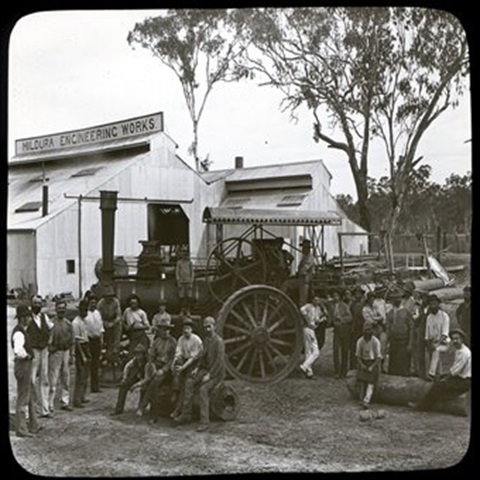
Mildura Arts Centre (MAC) is currently showcasing to the public what is arguably one of the most comprehensive photographic recordings of Mildura’s iconic formative years, when the Chaffey Brothers were establishing the district as an irrigation colony.
German photographer John William (JW) Lindt was commissioned to come to Sunraysia in the late 1880s to document the Chaffey Brothers’ work, which would then help visually promote the Mildura irrigation colony.
The resulting collection of photographs, taken in 1889, provide a stunning snapshot of what life was like during our city’s earliest post-settlement years, taking in everything from paddle steamers on the Murray River, stores lining unsealed streets through to hard-working locals busy at their jobs.
Councillor for Arts, Culture and Heritage Helen Healy said the amazing collection of photographs now on exhibition found their way to MAC via Doris Kilburn, the daughter of WB Chaffey’s business secretary, who came to be in possession of Lindt’s glass lantern slides.
Miss Kilburn donated the slides to MAC in 1983, where they have remained as a prominent part of the MAC collection.
The current exhibition, JW Lindt in Sunraysia, is the first time in many years the slides have been on display to the public.
“This is a fantastic opportunity to get a real feel for what our region looked like during its foundation years post-settlement,” Cr Healy said.
“It allows us to take a step back in time and really is a significant part of our municipality’s visual history.”
Cr Healy explained that before the slides were able to be exhibited they required some delicate conversation work.
“Given the slides had been stored in the original metal box in which they were donated to the Mildura Arts Centre, they did require some specialist treatment to clean and repair them before they could be returned and exhibited,” she said.
LW Lindt in Sunraysia will remain on exhibition in MAC’s Gallery 5 until Sunday, 16 October.
John William Lindt background
John William (JW) Lindt was born in Frankfurt, Germany in 1845. He boarded a Danish vessel at 17 and sailed to Australia, choosing to disembark in Brisbane, from where he continued to travel around Queensland before relocating to New South Wales.
His second job after arriving in Australia was at a photography studio, where the majority of his early work was created. This studio was in Grafton, New South Wales, where his well-known images of local Indigenous people were taken between 1868 and 1876.
Working at the studio and going on to own the business enabled him to establish independence and social flexibility, giving him the opportunity to leave Grafton and move to Melbourne, after which he was commissioned to Mildura to document the Chaffey Brothers’ work.








